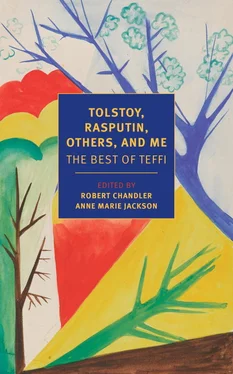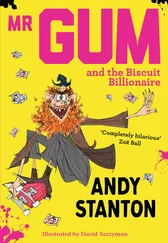Not long ago, a man got a splinter in his tongue from the bread. His tongue swelled up and he died. People had a good laugh. And he chose the wrong time, too. The very next day he could have got an egg on his ration card.
All that was a long time ago, needless to say. About ten days ago. Now it sounds like some fairy story.
The only people who can get eggs now are children. Four children are entitled to one egg between them, once a year.
That’s how we live. A lot of people are starting to think that we aren’t living, but quite simply dying. But then, when people are very hungry and very cold, and unhappy into the bargain, it’s probably all too easy for them to imagine they’re dying.
On the other hand…
Dear God, if it’s all the same to you, let us die a warm death.
Written in 1918, but published only posthumously Translated by Rose France
There are not many of them, of these refugees from Sovietdom. A small group of people with nothing in common; a small motley herd huddled by the cliff’s edge before the final leap. Creatures of different breeds and with coats of different colours, entirely alien to one another, with natures that have perhaps always been mutually antagonistic, they have wandered off together and collectively refer to themselves as “we”. They have wandered off for no purpose, for no reason. Why?
The legend of the country of the Gadarenes comes to mind. Men possessed by demons came out from among the tombs, and Christ healed them by driving the demons into a herd of swine, and the swine plunged from a cliff and drowned.
Herds of a single animal are rare in the East. More often they are mixed. And in the herd of Gadarene swine there were evidently some meek, frightened sheep. Seeing the crazed swine hurtling along, these sheep took to their heels too.
“Is that our lot?”
“Yes, they’re running for it!”
And the meek sheep plunged down after the swine and they all perished together.
Had dialogue been possible in the course of this mad dash, it might have resembled what we’ve been hearing so often in recent days:
“Why are we running?” ask the meek.
“Everyone’s running.”
“Where are we running to?”
“Wherever everyone else is running.”
“What are we doing with them ? They’re not our kind of people. We shouldn’t be here with them. Maybe we ought to have stayed where we were. Where the men possessed by demons were coming out from the tombs. What are we doing? We’ve lost our way, we don’t know what we’re…”
But the swine running alongside them know very well what they’re doing. They egg the meek on, grunting “Culture! We’re running towards culture! We’ve got money sewn into the soles of our shoes. We’ve got diamonds stuck up our noses. Culture! Culture! Yes, we must save our culture!”
They hurtle on. Still on the run, they speculate. They buy up, they buy back, they sell on. They peddle rumours. The fleshy disc at the end of a pig’s snout may only look like a five-kopek coin, but the swine are selling them now for a hundred roubles.
“Culture! We’re saving culture! For the sake of culture!”
“How very strange!” say the meek. “‘Culture’ is our kind of word. It’s a word we use ourselves. But now it sounds all wrong. Who is it you’re running away from?”
“The Bolsheviks.”
“How very strange!” the meek say sadly. “Because we’re running away from the Bolsheviks, too.”
If the swine are fleeing the Bolsheviks, then it seems that the meek should have stayed behind.
But they’re in headlong flight. There’s no time to think anything through.
They are indeed all running away from the Bolsheviks. But the crazed swine are escaping from Bolshevik truth , from socialist principles , from equality and justice, while the meek and frightened are escaping from untruth , from Bolshevism’s black reality, from terror, injustice and violence.
“What was there for me to do back there?” asks one of the meek. “I’m a professor of international law. I could only have died of hunger.”
Indeed, what is there for a professor of international law to do—a man whose professional concern is the inviolability of principles that no longer exist? What use is he now? All he can do is give off an air of international law. And now he’s on the run. During the brief stops he hurries about, trying to find someone in need of his international law. Sometimes he even finds a bit of work and manages to give a few lectures. But then the crazed swine break loose and sweep him along behind them.
“We have to run. Everyone is running.”
Out-of-work lawyers, journalists, artists, actors and public figures—they’re all on the run.
“Maybe we should have stayed behind and fought?”
Fought? But how? Make wonderful speeches when there’s no one to hear them? Write powerful articles that there’s nowhere to publish?
“And who should we have fought against?”
Should an impassioned knight enter into combat with a windmill, then—and please remember this—the windmill will always win. Even though this certainly does not mean—and please remember this too—that the windmill is right.
They’re running. They’re in torment, full of doubt, and they’re on the run.
Alongside them, grunting and snorting and not doubting anything, are the speculators, former gendarmes, former Black Hundreds [1] See “ New Life ”, note 29.
and a variety of other former scoundrels. Former though they may be, these groups retain their particularities.
There are heroic natures who stride joyfully and passionately through blood and fire towards— ta-rum-pum-pum!— a new life!
And there are tender natures who are willing, with no less joy and no less passion, to sacrifice their lives for what is most wonderful and unique, but without the ta-rum-pum-pum . With a prayer rather than a drum roll.
Wild screams and bloodshed extinguish all light and colour from their souls. Their energy fades and their resources vanish. The rivulet of blood glimpsed in the morning at the gates of the commissariat, a rivulet creeping slowly across the pavement, cuts across the road of life for ever. It’s impossible to step over it.
It’s impossible to go any farther. Impossible to do anything but turn and run.
And so these tender natures run.
The rivulet of blood has cut them off for ever, and they shall never return.
Then there are the more everyday people, those who are neither good nor bad but entirely average, the all too real people who make up the bulk of what we call humanity. The ones for whom science and art, comfort and culture, religion and laws were created. Neither heroes nor scoundrels—in a word, just plain ordinary people.
To exist without the everyday, to hang in the air without any familiar footing—with no sure, firm earthly footing—is something only heroes and madmen can do.
A “normal person” needs the trappings of life, life’s earthly flesh—that is, the everyday.
Where there’s no religion, no law, no conventions, no settled routine (even if only the routine of a prison or a penal camp), an ordinary, everyday person cannot exist.
At first he’ll try to adapt. Deprived of his breakfast roll, he’ll eat bread; deprived of bread, he’ll settle for husks full of grit; deprived of husks, he’ll eat rotten herring—but he’ll eat all of this with the same look on his face and the same attitude as if he were eating his usual breakfast roll.
But what if there’s nothing to eat at all? He loses his way, his light fades, the colours of life turn pale for him.
Читать дальше












